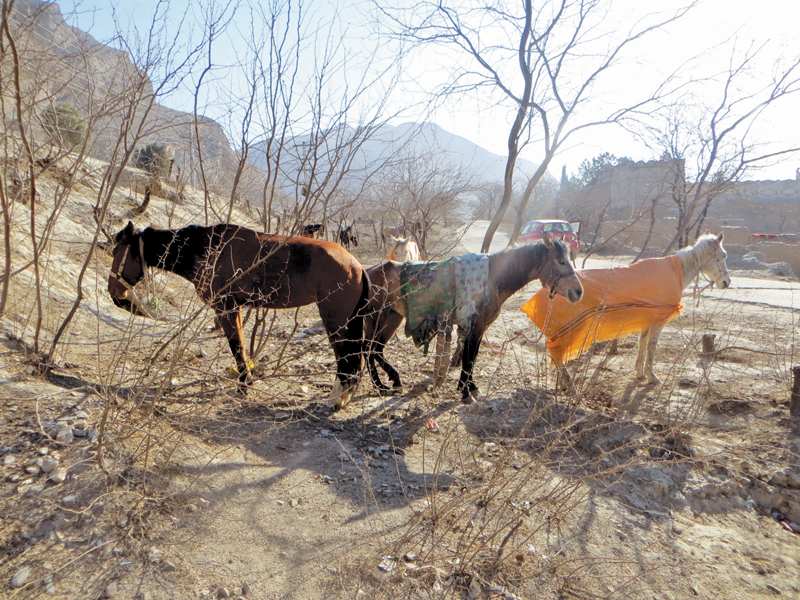
Camped at the last resting place at Sheikhmal Khel before crossing the border from Khyber Agency into Afghanistan, a caravan of eight people stretch their legs and feed their mules, the most valuable members of the group. Without the mules, there would be no journey.
“We have less to eat for ourselves and more for the mules,” said Mubaraz Khan, while removing a bowl containing a mixture of grains and milk from the snout of his mule.

A resident of Hassan Garhi, Peshawar, Khan and his fellow travelers have begun their arduous journey through remote mountainous trails and hidden passes.
Travelling without documents means they must use this treacherous route and avoid the main roads.
Like many other opportunists that traverse this elusive, yet beaten path, Khan hopes to earn a substantial amount of money doing anything and everything along the way. This includes working in a brick kiln, transporting ‘anything’ to Kabul or further north to the city of Mazaar Sharif and Badakhshan – the northernmost province bordering Tajikistan. Kabul is a three-day hike after crossing the border while Badakhshan is a tough eight-day journey.
“We are not smugglers, but we sometimes facilitate illegal cross-border business,” said Khan, adding he has helped smuggle spare parts and electronics in the past.
Khan expects to return home in the fall with his pockets full. But there is no profit to be made without his mule.
Stronger than horses, mules are more sure-footed and less likely to stumble on rough and narrow roads that meander through the mountains. The tracks and makeshift roads through this terrain can only be travelled on foot or on a mule’s back. Mules are also less expensive.
“The people travelling through these narrow passes have to learn one rule; you must never separate from your mule in the wilderness because that would mean a horrible death for both you and the animal,” said Jamrud resident Sanan Shah, who has been in this business for some time.
The high life
While mules are often fed better than their human companions, they are also drugged with cannabis, endangering the animal’s health. Mixed with milk, the cannabis affects the mule’s heart rate which is harmful in such extreme and fluctuating conditions. However, it also helps the animal withstand the cold as well as reduce any pain the mule may feel during the strenuous trek.
Unfortunately, it shortens the animal’s life span and most only live up to three years.

Some who travel as far as the Tajikistan border give their mules vodka in place of cannabis juice.
Sanan Shah said the animals can only travel three to four months after which they must be given a long rest due to weakness and exhaustion.
Rent-a-mule
A resident of Urmar from the outskirts of Peshawar, Shahid Gul, also owns his own mule. He has travelled with caravans consisting of eight to ten mules, along with people from different parts of the city, Khyber Agency and the Frontier Regions (FR).
“One can earn a fortune from these journeys,” shared Gul.
Each mule costs around Rs40,000 but most people can’t afford their own animal. According to Gul, labourers rent mules from markets in Landikotal and Peshawar’s Hassan Garhi and Bhanamari areas for Rs8,000 a month. It is worth their while because ‘trade’ and ‘labour’ in Afghanistan over a four-month period is fruitful enough to pay the full price of the mule plus some interest.

There are some traders who don’t have to make the trek deep into Afghanistan to make profits. Landikotal resident Reza Gul owns around 30 mules and each earns a profit from Rs60,000 to 70,000 a season. His mules do not travel more than 10 miles across the border. Reza, who rents out his mules, said these animals work well in cold climates and cannot survive the summer heat, adding neither a donkey nor a horse would survive these conditions.
Narrow trails wind down alongside sheer walls of rock and sometimes disappear at the next turn, he said. Some makeshift roads are invisible under the rubble that could have been caused by a landslide. “At times you will look 20 inches to your left and there will be a frightening drop of around 4,000 feet,” he said, adding that one can find remnants of Russian armory from the time of the Soviet Invasion.
Political administration officials in Khyber Agency are often blamed for playing a major role in cross-border smuggling. When contacted over the issue of this non-taxed trade, an official declined to comment.
It is believed that these officials are aware of these routes and allegations have been made about them taking bribes to keep mum.
Daftar Khan, a political administration official from Landikotal tehsil, said they were not aware of these hidden smuggling routes, adding he will investigate the matter.
Published in The Express Tribune, April 28th, 2014.
COMMENTS (6)
Comments are moderated and generally will be posted if they are on-topic and not abusive.
For more information, please see our Comments FAQ

1732274008-0/Ariana-Grande-and-Kristin-Chenoweth-(1)1732274008-0-165x106.webp)









if there was peace in our area, these mules and the landscape of the area wold ave been the best spot for foreign tourists....
can u plz mention who supports the cross border smuggling?
the author has totally misinterpreted it ..the mules are used not just for smuggling but also for the hectic jobs in the mountains and its the only source of travelling in those areas.
very well written story about the uniqueness of Fata.
well done ET, great story to read